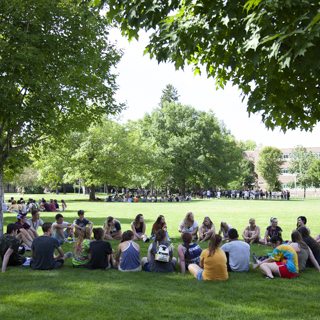Private Student Loans
Many lending agencies offer private student loans as an alternative to the federal loan programs. However, private student loans should be considered loans of last resort. With limited exceptions, they are more costly then the federal loans and do not provide the same protections to borrowers.
Application for a private student loan is made directly to the lender, typically online. In turn, the lender then requests certification of eligibility from UM.
Before pursuing a private student loan, students should complete the FAFSA and/or consult staff in the financial aid office to make sure all other options have been exhausted.
Private Student Loan Details
The easiest way to find a private loan lender is to perform an Internet search for "private student loan" or "alternative student loan". When deciding who to choose, consider the interest rate, fees, terms of repayment (e.g. is payment delayed until after student ceases to be enrolled) and the reputation of the lender.
UM does not provide recommendations on specific lenders. It is up to the student to decide which lender is best for them.
Private student loans, by law, must be for educational expenses.
Initially, a student may request and receive approval from the lender for a specific loan amount. However, when UM certifies the loan the amount will be limited to the Cost of Attendance (COA) minus other aid received. This is often less than what the lender pre-approved.
A student who borrows $30,000 at an average interest rate of 8% and uses the standard repayment schedule (120 equal payments) will have monthly payments of $364. When the loan is paid in full after 10 years they will have paid a total of $43,678.
To receive a customized loan repayment schedule a student can access the US Department of Education's Loan Simulator or the loan calculators at finaid.org. The lender may also have sample repayment plans available at their website.
Private loans often have different rules than the federal loan programs:
- Some lenders do not require that a student be making satisfactory academic progress
- Some lenders allow loans for less-than-half-time enrollment (5 credits or less)
- Some will issue loans after the academic year/term is over
- Some lenders allow loans for courses not required for the degree (e.g. a minor)
- Most lenders allow a student to borrow up to the cost of attendance (COA)
Private loans often have different rules than the federal loan programs:
- Interest rates are dependent on the strength of the student's (and cosigner's) credit rating and is usually higher than what is available in the federal loan programs.
- There are often up front fees associated with the loans, particularly if a student wants to defer payment until after school. These fees are usually larger than the origination fees on federal student loans.
- Many students are not approved because their credit rating is not strong enough and they don't have a credit-worthy cosigner.
- Federal student loans have many options for students who have difficulty with loan repayment, including loan consolidation, loan forgiveness, or discharge of loan due to death or permanent disability. Most private loans do not have such provisions.
Some lenders require that a student be making satisfactory academic progress (SAP), which includes compliance with the maximum time frame (max credit) rules.
If a student is seeking a private loan because they are not eligible for federal loans due to not making SAP, or because they are not able to complete their degree within the maximum timeframe, they must check to see if this is a requirement of the lender.
If a lender requires that a student be making satisfactory academic progress, and the student is not, the loan will not be certified by UM. If the lender does not have an SAP requirement, the loan will be approved, as long as the student meets all other eligibility requirements.
Usually, within 24 hours of approval by the lender a request for certification is forwarded to UM. Staff in the financial aid office strive to have all private loans certified within three business days. However, certification is not performed until a student's federal application has gone through final review.
If a student is not applying for federal aid then they will need to submit UM's Private Loan Only Worksheet before the loan will be certified.
Generally, a private loan will be for the full academic year, the money being disbursed in two payments, half each term.
The Truth In Lending Act requires that disbursement of all private loans be delayed a minimum of three days to allow a student time to rethink their decision. Some lenders have longer delays. This cannot be overridden by UM.
